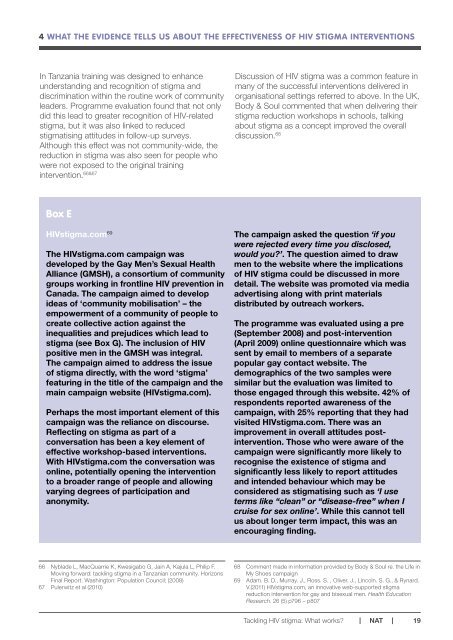Tackling HIV Stigma What works?
Jun_16_Tackling_HIV_Stigma
Jun_16_Tackling_HIV_Stigma
Create successful ePaper yourself
Turn your PDF publications into a flip-book with our unique Google optimized e-Paper software.
4 WHAT THE EVIDENCE TELLS US ABOUT THE EFFECTIVENESS OF <strong>HIV</strong> STIGMA INTERVENTIONS<br />
In Tanzania training was designed to enhance<br />
understanding and recognition of stigma and<br />
discrimination within the routine work of community<br />
leaders. Programme evaluation found that not only<br />
did this lead to greater recognition of <strong>HIV</strong>-related<br />
stigma, but it was also linked to reduced<br />
stigmatising attitudes in follow-up surveys.<br />
Although this effect was not community-wide, the<br />
reduction in stigma was also seen for people who<br />
were not exposed to the original training<br />
intervention. 66&67<br />
Discussion of <strong>HIV</strong> stigma was a common feature in<br />
many of the successful interventions delivered in<br />
organisational settings referred to above. In the UK,<br />
Body & Soul commented that when delivering their<br />
stigma reduction <strong>works</strong>hops in schools, talking<br />
about stigma as a concept improved the overall<br />
discussion. 68<br />
Box E<br />
<strong>HIV</strong>stigma.com 69<br />
The <strong>HIV</strong>stigma.com campaign was<br />
developed by the Gay Men’s Sexual Health<br />
Alliance (GMSH), a consortium of community<br />
groups working in frontline <strong>HIV</strong> prevention in<br />
Canada. The campaign aimed to develop<br />
ideas of ‘community mobilisation’ – the<br />
empowerment of a community of people to<br />
create collective action against the<br />
inequalities and prejudices which lead to<br />
stigma (see Box G). The inclusion of <strong>HIV</strong><br />
positive men in the GMSH was integral.<br />
The campaign aimed to address the issue<br />
of stigma directly, with the word ‘stigma’<br />
featuring in the title of the campaign and the<br />
main campaign website (<strong>HIV</strong>stigma.com).<br />
Perhaps the most important element of this<br />
campaign was the reliance on discourse.<br />
Reflecting on stigma as part of a<br />
conversation has been a key element of<br />
effective <strong>works</strong>hop-based interventions.<br />
With <strong>HIV</strong>stigma.com the conversation was<br />
online, potentially opening the intervention<br />
to a broader range of people and allowing<br />
varying degrees of participation and<br />
anonymity.<br />
The campaign asked the question ‘if you<br />
were rejected every time you disclosed,<br />
would you?’. The question aimed to draw<br />
men to the website where the implications<br />
of <strong>HIV</strong> stigma could be discussed in more<br />
detail. The website was promoted via media<br />
advertising along with print materials<br />
distributed by outreach workers.<br />
The programme was evaluated using a pre<br />
(September 2008) and post-intervention<br />
(April 2009) online questionnaire which was<br />
sent by email to members of a separate<br />
popular gay contact website. The<br />
demographics of the two samples were<br />
similar but the evaluation was limited to<br />
those engaged through this website. 42% of<br />
respondents reported awareness of the<br />
campaign, with 25% reporting that they had<br />
visited <strong>HIV</strong>stigma.com. There was an<br />
improvement in overall attitudes postintervention.<br />
Those who were aware of the<br />
campaign were significantly more likely to<br />
recognise the existence of stigma and<br />
significantly less likely to report attitudes<br />
and intended behaviour which may be<br />
considered as stigmatising such as ‘I use<br />
terms like “clean” or “disease-free” when I<br />
cruise for sex online’. While this cannot tell<br />
us about longer term impact, this was an<br />
encouraging finding.<br />
66 Nyblade L, MacQuarrie K, Kwesigabo G, Jain A, Kajula L, Philip F.<br />
Moving forward: tackling stigma in a Tanzanian community. Horizons<br />
Final Report. Washington: Population Council; (2008)<br />
67 Pulerwitz et al (2010)<br />
68 Comment made in information provided by Body & Soul re. the Life in<br />
My Shoes campaign<br />
69 Adam. B. D., Murray. J., Ross. S. , Oliver. J., Lincoln. S. G., & Rynard.<br />
V.(2011) <strong>HIV</strong>stigma.com, an innovative web-supported stigma<br />
reduction intervention for gay and bisexual men. Health Education<br />
Research. 26 (5) p796 – p807<br />
<strong>Tackling</strong> <strong>HIV</strong> stigma: <strong>What</strong> <strong>works</strong>? NAT 19


